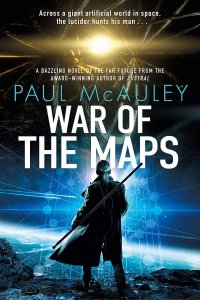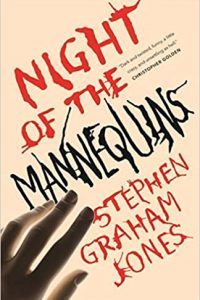Paul Di Filippo Reviews War of the Maps by Paul McAuley
 War of the Maps, Paul McAuley (Gollancz 978-1473217348, £14.99, 432pp, hardcover) March 2020
War of the Maps, Paul McAuley (Gollancz 978-1473217348, £14.99, 432pp, hardcover) March 2020
From the opening lines of Paul McAuley’s magnificent new novel of an exotic far-future world anchored by intensely human characters, we can sense that certain archetypical templates and genres are in play.
A lone tree leaned over the cistern, its bell-shaped yellow-leaved canopy dinting and swaying in the hot breeze, sprinkling coins of mirrorlight across the water and the effigy of a toad, carved from a knot of bonewhite wood, which crouched on a slab of rock at the water’s edge. The lucidor picked up the stoneware beaker set between the toad’s long-toed feet, left by some unknown traveller and used by many such since, and dipped it in the cistern and drank the measure of cool water straight down and refilled it and sat back on his heels. Sipping slowly, wondering if the toad was the avatar of a godling or the spirit animal of one of the vagrant tribes that wandered the borderlands, wondering if the bandits knew about the little oasis. Most likely they did. This was their territory and he was a stranger here, passing through on his way to somewhere else.
What do I have in mind exactly as the vessel into which this story will be poured? The classic cinematic Western, that morality play populated by high and low figures, stark or eccentric, complex or primal, and occurring in a stark, at times beautiful landscape that shapes the culture, and vice versa. As we soon learn, our hero is an ex-lawman on the trail of an outlaw who intends to perpetrate more evil. He is motivated by noble principles and not a little pride and validation of his self-image. In short, we could be watching that great Anthony Mann Western starring Jimmy Stewart, The Naked Spur.
Does this mean that War of the Maps is a mere “Bat Durston” story then? “Bat Durston,” as longtime fans might recall, was the imaginary hero profiled in a Galaxy magazine advertisement, a fake-out SF protagonist who was simply a cowboy wearing a fishbowl helmet, his six-gun traded for a blaster. But of course, this is far from the case with McAuley’s sophisticated novel, just as Jonathan Lethem’s Girl in Landscape was bigger than its model, John Wayne’s The Searchers. Here the mythic armature of the Western and some of its fancy dress is melded seamlessly with pure-quill SF, producing a hybrid like those famous SF-mystery hybrids such as The Caves of Steel. And in fact, War of the Maps inhabits another tradition just as fully: it’s a Dying Earth book, evoking and equaling Vance and Wolfe. Think of our hero as analogous to Severian or Cugel.
The action, I will reveal, takes place on the habitable outer surface of a Dyson Sphere, illuminated and warmed by a system of artificial stellar radiance. This is a bit of a spoiler, but not much, and certainly nothing to detract from your enjoyment of the tale. McAuley lets us in on the secret quite early. This venue was constructed by posthumans of godlike capacity who then abandoned it. Now it is running down, and, most vitally, a certain segment of the world is host to a plague that threatens to overspread the rest of the “maps,” as the natives call their little ecosystem-polities.
Our hero, Thorn the aging lucidor (his title designates a lawman), hails from the map dubbed the Free State, a kind of collectivist society. Its immediate neighbor is the map known as Patua, a more capitalist, mercantile, individualist nation. (The theme of these opposing ideologies only bubbles under the surface until the very end of the book, when it becomes suitably explicit. Mostly, events are too fast-moving and dire to permit lofty philosophical-political debates.) Patua has become the willing host to an infamous criminal from the Free State—partially with the connivance of the Free State itself. The man is known as Remfrey He, a malign Doctor Moreau-type figure. Thorn captured him and jailed him at much cost, physical and mental, and cannot stand to have the villain free. So, lacking cooperation from his bosses, he tosses over his job and sets out to re-capture the outlaw.
Traveling on foot across the bizarre patchwork countryside, with all hands turned against him, Thorn is the ultimate lone avenger. McAuley builds up a deep and resonant portrait of his hero not only by limning his semi-tragic backstory, but by exhibiting to us the many ethical, altruistic, and sometimes necessarily merciless and utilitarian choices Thorn must make.
Eventually, after a plethora of vividly outré and dangerous encounters with an astonishing variety of people and beasts—including partial and intermittent possession of his brain by a “shatterling,” or remnant tool of the vanished gods—Thorn lands in the civilized capital of Patua. He goes face-to-face with Remfrey He, but the man escapes. The obsessive quest must continue, this time accompanied by two Patuan women, a biologist named Orjen and her practical and feisty assistant Lyra. Their expedition across thousands of leagues of ocean lands them in the heart of the contaminated zone—a situation that plays out like the great Japanese film Matango: Attack of the Mushroom People. Here, Thorn will triumph or fail, but never give up.
McAuley has outdone himself along every possible vector here. His characters have never been more fully fleshed-out or interesting. Even the most minor receives careful sculpting. And Remfrey He, even though his is actually onstage very little, steals all his scenes, as colorfully diabolical as any of Vance’s Demon Princes. Likewise, McAuley’s fecund creativity concerning cultures and organisms is at a peak. (Think Vance’s The Dragon Masters.) His conception of the mechanics and cosmology of the Dyson Sphere is rich. The conveyance of a sense of deep history of billions of years rivals that of Wolfe. And the vibrancy of the unrelenting action scenes, all lucidly “filmed,” is rivaled only by Thorn’s interior monologue that parses all the action along emotional and moral lines.
One last virtue is the organic feeling of the plot. Nothing seems forced or constrained, and thus nothing is predictable. For instance, one major plot pivot occurs when Thorn is stuck in the ship’s windowless brig, and thus he—and we—witness nothing but vague noises. A lesser author would have felt compelled to stick Thorn at the center of the melee. But since he has authentically found himself imprisoned, we must share his viewpoint. This makes for a more real experience.
Like Zatoichi the Blind Swordsman, Thorn is a tragic but unpitiable figure, in some sense bigger than life, and in others, the salt of the earth. His quest is one you will never forget, and feel privileged to share.
 While you are here, please take a moment to support Locus with a one-time or recurring donation. We rely on reader donations to keep the magazine and site going, and would like to keep the site paywall free, but WE NEED YOUR FINANCIAL SUPPORT to continue quality coverage of the science fiction and fantasy field.
While you are here, please take a moment to support Locus with a one-time or recurring donation. We rely on reader donations to keep the magazine and site going, and would like to keep the site paywall free, but WE NEED YOUR FINANCIAL SUPPORT to continue quality coverage of the science fiction and fantasy field.







